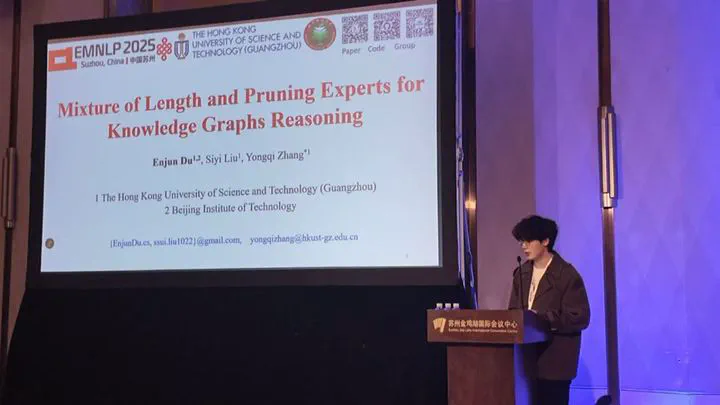EMNLP 2025 Oral
 Presentation at EMNLP 2025
Presentation at EMNLP 2025Abstract
Knowledge Graph (KG) reasoning, which aims to infer new facts from structured knowledge repositories, plays a vital role in Natural Language Processing (NLP) systems. Its effectiveness critically depends on constructing informative and contextually relevant reasoning paths. However, existing graph neural networks (GNNs) often adopt rigid, query-agnostic path-exploration strategies, limiting their ability to adapt to diverse linguistic contexts and semantic nuances. To address these limitations, we propose \textbf{MoKGR}, a mixture-of-experts framework that personalizes path exploration through two complementary components: (1) a mixture of length experts that adaptively selects and weights candidate path lengths according to query complexity, providing query-specific reasoning depth; and (2) a mixture of pruning experts that evaluates candidate paths from a complementary perspective, retaining the most informative paths for each query. Through comprehensive experiments on diverse benchmark, MoKGR demonstrates superior performance in both transductive and inductive settings, validating the effectiveness of personalized path exploration in KGs reasoning.
Date
Nov 5, 2025 10:00 AM — 10:30 AM
Event
Location
Suzhou, China
Suzhou International Expo Center, Suzhou, Jiangsu 215021
This page highlights my Oral Presentation at EMNLP 2025 in Suzhou, China.
Click on the Slides button above to view my presentation slides.
Click on the Slides button above to view my presentation slides.
Our talk introduces Mixture of Length and Pruning Experts for Knowledge Graphs Reasoning, a new method for KGs Reasoning
Key contributions include:
- We propose a personalized path exploration strategy for knowledge graph reasoning that adapts to query-specific requirements and entity characteristics.
- We introduce a novel mixture-of-experts framework that facilitates personalization in KGs reasoning. The incorporating of both adaptive length-level weighting and personalized pruning strategies effectively addresses the critical limitations of fixed path length and uniform path exploration.
- Experimental results on transductive and inductive datasets highlight MoKGR’s achievement of superior reasoning accuracy and computational efficiency.
Further event details are available at the EMNLP 2025 website.